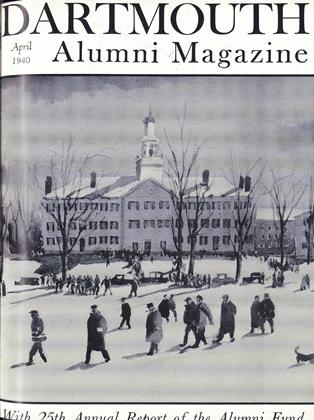THE 500 GALLONS that Eleazar started with never impressed me much when I considered how long it must last. New England flourished on hard cider but the pioneers had to wait a decade before they could bring cider trees to bearing. In fact an early Vermont law put cider and students together in a favored classification. It exempted from a personal tax "each college student until three years after he had taken his first degree." It also exempted all "land planted to apple trees, at least forty to an acre, for a period of ten years.
Without question Eleazar was both discreet and dignified but he played the market, at least he did not mind a little fling in land speculation. In 1761 he was one of 61 to purchase of Governor Benning Wentworth a charter to the town of Strai ford, Vermont. By this deal he owned one sixty seventh of 23,040 acres and his investment was not over three pounds.
Three years later Eleazar learned a financial lesson. The king in England decided that his trusty Benning Wentworth was out of bounds, and the land really belonged to the worthy governor at Albany and that thrifty ruler offered to validate the charter for about four times the amount that Governor Benning had received and was now spending. Eleazar in his Connecticut pulpit preached a particularly vitrolic sermon on the next Sabbath and then forgot it.
After another three years the king changed what mind he had and informed the New York governor that the original charter was O.K. Eleazar however was now saving up his pennies for the 500 gallons and the trek to Hanover so he refused to chip in when the other proprietors anted for a clearing and sales campaign.
There followed seven years of frontier settlement and then the Revolutionary War fought as a Vermont statute declares "by the United States and Us." In those days and since Vermont was independent and did what was right in its own eyes. In good time Eleazar died but his rockbound acres had not moved nor had the taxes been paid. So in 1791—the newspaper notice is before me—Eleazar Wheelock ordered to pay 11 shillings or have sold at public vendue as much of his 343 acres as would pay the 11 shillings and the costs of action.
He didn't do it. Perhaps he no longer cared. Perhaps Saint Peter accepted the loss as a deduction in his income tax.
 View Full Issue
View Full Issue
More From This Issue
-
 Article
ArticleRich Man's College?
April 1940 By JOHN HURD JR '21 -
 Article
ArticleMeet Bill Daniels—
April 1940 By CHARLES E. WIDMAYER '30 -
 Class Notes
Class Notes1930*
April 1940 By Chairman, ALBERT I. DICKERSON -
 Sports
SportsBig Green Teams
April 1940 By Whitey Fuller '37 -
 Class Notes
Class Notes1925*
April 1940 By Chairman, FORD H. WHELDEN -
 Class Notes
Class Notes1938*
April 1940 By Chairman, CARL F. VON PECHMANN
E. W. Butterfield '97
Article
-
 Article
ArticleContributions by Classes in 1939 Alumni Fund Campaign
April 1940 -
 Article
ArticleResults of Council Elections Announced
MAY 1965 -
 Article
ArticleSpring Schedule
April 1956 By CLIFF JORDAN '45 -
 Article
ArticleA Not-So-Ancient Tradition: The Rag
MARCH 1994 By Ericka F. Houck '93 -
 Article
ArticleEllwood Huff Fisher '21: A Tribute
September 1975 By JOHN HURD '21 -
 Article
ArticlePractical Memorial
December 1945 By P. S. M.



